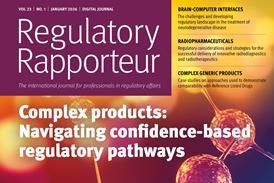Pharmaceuticals – Page 6
-

-

-

-

-

-

-
 Journal
JournalOver two years into the new veterinary medicines rules for the EU: a reflection on where we are now
The European Union’s Veterinary Medicines Regulation became law on 27 January 2019 and brought many changes, some of which were highly significant
-
 Journal
JournalOpportunities and challenges in the Latin American pharmaceutical industry
Despite competition from both local and international players, the Latin American pharmaceutical market has experienced a steady growth in recent years
-
 Journal
JournalThe UK Responsible Person Association
The UK Responsible Person Association was established soon after the implementation of Brexit to represent and promote the newly created profession of UK Responsible Person
-
 Editorial
EditorialThe global access battle for healthcare equity
Regulatory Rapporteur June 2024 | Volume 21 | No.6 The World Health Organization (WHO) has estimated that one-third of the global population lacks regular access to essential medicines. The concept of access to medicines will likely resonate differently within ...
-
 Journal
JournalProject Orbis – a sponsor’s perspective on the collaborative international review process
Project Orbis provides a framework for concurrent submission and review of regulatory dossiers with member agencies in the project, and has the goal of providing faster patient access to innovative cancer therapies
-
 Journal
JournalComparing China Drug Master Files with the EU and US
This is the third article in a six-part series that will focus on the regulations in China’s drug market. There will be different topics each month with the initial focus on the drug master file (DMF) filing process followed by the drug registration process and pharmacovigilance requirements.
-
 Journal
JournalThe availability of medicines post-Brexit in Malta
Malta has historically sourced medicinal supplies from the UK, but following Brexit insufficient supply of medicines represents a significant obstacle to patients’ access to medicines.
-

-
 Podcasts
PodcastsRegRapPod − In Conversation with Bengt Mattson
BONUS EPISODE: In Conversation talking sustainability with Bengt Mattson
-
 Podcasts
PodcastsRegRapPod − May 2024
Vol.21 #5: In May 2024’s RegRapPod, host Alan Booth talks to Issue Editor Harriet ‘Podcast’ Edwards about her specialist subject ATMPs.
-
 Editorial
EditorialUnlocking a new paradigm of healthcare through advanced therapies
Regulatory Rapporteur May 2024 | Volume 21 | No.5 It seems like a recurring theme to start our advanced therapy medicinal products (ATMPs) issue with a familiar message: we are undoubtedly entering a new paradigm of ...
-
 Journal
JournalThe first approval of a CRISPR-Cas9 gene editing medicinal product in the European Union: Casgevy
Regulatory Rapporteur May 2024 | Volume 21 | No.5 Abstract Patients with transfusion-dependent β-thalassemia and severe sickle cell disease suffer the burden of repeated blood transfusions and vaso-occlusive crises, respectively. Casgevy (exagamglogene autotemcel) consists of autologous CD34+ haematopoietic stem ...
-

-




















